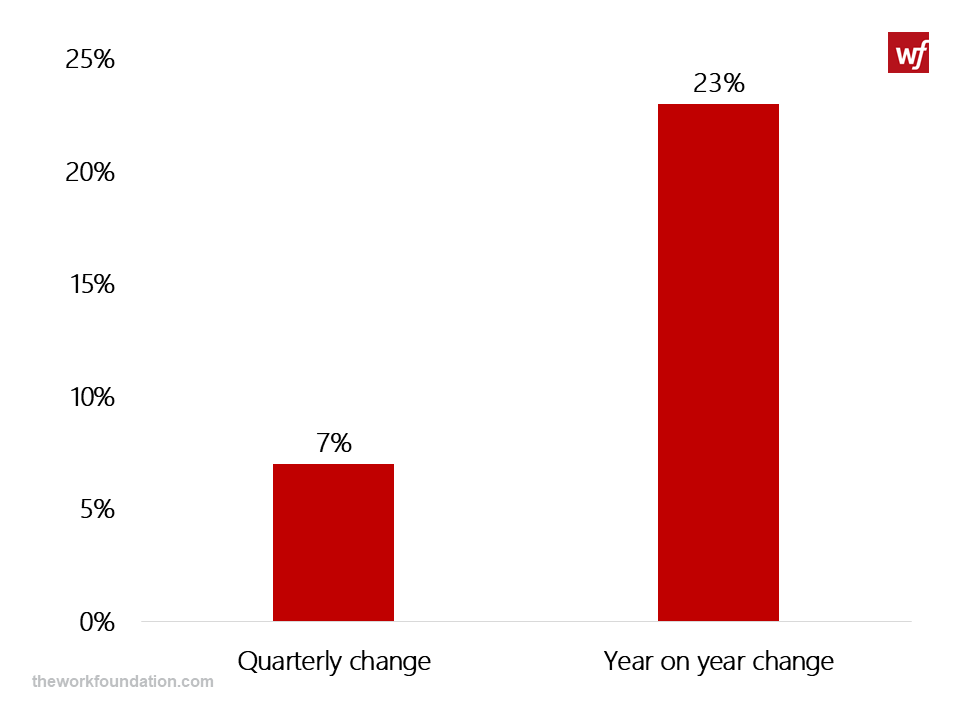Rise in temporary work: balancing flexibility and insecurity
Posted on
 © Photo by Francesco Gallarotti on Unsplash
© Photo by Francesco Gallarotti on Unsplash
Today’s labour market figures show that the number of workers on temporary contracts is on the rise and, worryingly, that a larger share of temporary workers are doing this involuntarily. Although the ability to draw on flexible labour is important for employers under the current challenging circumstances, and for workers, being able to access some work is on the whole better than not being able to access any, we must remain aware of the potentially longer-term, negative impacts that prolonged periods of working on temporary contracts can have. With an economic and labour market recovery expected by the middle of 2022, we must ensure that this shift to higher levels of temporary work does not become a more permanent feature of the labour market as this takes place, and that workers across the economy are able to access good quality, secure employment.
Rising temporary employment
Despite an overall decline in the number of payroll employees by 813,000 over the past year, some forms of insecure work are expanding. The number of temporary workers increased by 2% (24,000) on the quarter and 4% (65,000) on the year. As of December-February, there are over 1.5m temporary workers in the UK. Temporary work can provide flexibility to businesses, as well as workers. However, this month’s figures indicate that the number of workers who are in involuntary temporary work, meaning they were unable to find permanent work, has gone up by 23% over the past year, which is an increase of 89,000 workers.
Fig. 1: Change in number of temporary workers Dec-Feb 2020/21

Source: Work Foundation calculations using ONS Dataset A01: Full-time, part-time and temporary workers (seasonally adjusted). 20 April 2021
What we know about the longer-term impacts of temporary work.
Flexible options in uncertain times have some benefits. With job opportunities remaining constrained by a slow recovery in vacancies, temporary work might be better than no work, and it is undoubtedly beneficial for employers who may be grappling with unpredictable demand as consumer confidence recovers. However, it is ultimately important that this trend does not continue beyond the crisis, because of the potential negative long-term effects it has on workers.
Research has found temporary jobs to be more likely to have ‘bad job’ characteristics, meaning temporary jobs are more likely to be lower paid, and provide workers with less access to training and development, career progression, and employer sick pay. If engaged in such work for a short period of time, this may not negatively affect workers. However, when individuals work a series of temporary jobs over a prolonged period of time, there are associated wage penalties and a lower likelihood of being able to obtain permanent work. It is therefore important that government balances businesses’ pandemic-related need for flexibility, with the need for a longer-term strategy to stimulate the growth of secure, good quality jobs when we enter into the recovery
Looking towards the recovery
Over the coming months, there should be a renewed focus on improving job quality, not just increasing the number of available jobs. Although policy makers will understandably want to prioritise getting workers into jobs as soon as possible, the pay and security that those jobs offer is just as important. The forthcoming Employment Bill offers an opportunity to strengthen worker rights and protections in this regard, for example by ensuring the legislation allows agency workers and those on temporary or zero hour contracts the right to request a contract which guarantees hours that better reflect those actually worked.
Furthermore, as we progress through the roadmap out of lockdown, it is critical that government does not lose sight of containing the spread of the virus. Any reversion back into restrictions or full lockdowns will affect business confidence in sectors such as hospitality and non-essential retail, which will likely only further drive the trend towards temporary work and other insecure forms of unemployment.
Related Blogs
Disclaimer
The opinions expressed by our bloggers and those providing comments are personal, and may not necessarily reflect the opinions of Lancaster University. Responsibility for the accuracy of any of the information contained within blog posts belongs to the blogger.
Back to blog listing




